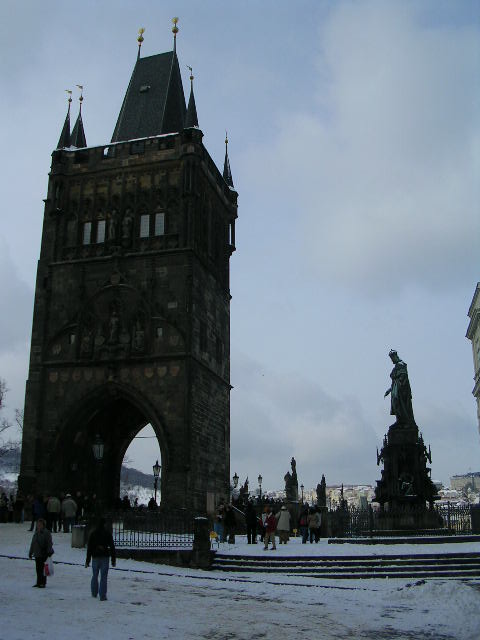The last Newbery of the 1920s, The Trumpeter of Krakow by Eric P. Kelly, is a Polish medieval adventure. Outside of Dr. Doolittle, this week’s story finally had all the elements I would expect to be in a Newbery: young teens as the main characters, a vivid setting, a few sets of villains, and obstacles to overcome, all in a writing-style that seemed vaguely appropriate for your average 10-14 year old. But, I admit, I have a soft spot for late medieval European stories, so that might have made me like it more than perhaps I would normally.
(Slight aside, excuse the photographs of Prague and Budapest instead of images of 15th century Krakow or illustrations. Being in Atlanta has limited my access to library books. So enjoy Evan’s pictures of Prague and Budapest.)
What I liked. Friends, we have our first young female character with a name in a novel-length book! Her name is Elzbietka, and at one point in the book she saves the day, in what I think is the best sub-plot of the book: Two hundred years before, when Krakow was under siege, the brave trumpeter played the “Hymn to Our Lady” until an arrow pierced him and the last few notes of the hymn were cut short. And ever after, those notes weren’t played to honor the brave 13th century trumpeter. So 200 years later, Elzbietka knew that as Joseph played those last few notes at the first watch of the night, he was in trouble. And she ran to get help. Go Elzbietka! I just wish she had been in more of the story with Joseph.
What was interesting. I thought all the ways that alchemy was portrayed in the story were the most fascinating. Elzbietka’s uncle, and Joseph’s neighbor, is an alchemist who is good, but is being mislead (hypnotized! As Kelly explains in a modern aside about how someone could be “possessed”) by an evil German university student. Ever since I read John Granger’s work on the alchemical symbolism in Harry Potter, it has been one of my favorite things to try and work out in my reading and own writing. And that the philosopher’s stone ended up being something evil that in the end was cast away was a twist that I wasn’t expecting. However, I admit most kids are probably going to be mostly just confused by the rather esoteric alchemical references.
What were some limitations. Not to be a completely fussy historian…but… the magical object of the story was hidden in a pumpkin. Pumpkins were a Columbian exchange product, so there weren’t any pumpkins in Europe in the mid 1400s when the book takes place. I suppose it wouldn’t be as cool to keep the stone in a giant parsnip, but it would have been more accurate. (Also shameless plug for giant lesson plan/website project I helped Evan with on Columbian Exchange.) Kelly may have chosen a pumpkin because one of the alchemical vessels the stone is kept in can be called a cucurbite which is shaped like a pumpkin (or a gourd). (For more on the mysterious and slippery world of alchemical imagery check out Lyndy Abraham’s A Dictionary of Alchemical Imagery.)
But beside my vegetable -anachronism-spotting, I thought that in some ways the book tried to take on too much plot and not enough character development. I would have liked to get to know Joseph and Elzbietka more. For example, 14 year old Joseph goes to school for the first time when they move to Krakow, and there is no description of his experience there.
Why I think it’s a Newbery/Similarity to other Newbery winners. Similar to the 3rd winner, The Dark Frigate, Trumpeter is an action-packed medieval adventure tale centering on a teenager getting wrapped up in complex plots of thugs and ruffians. But unlike Frigate, Trumpeter is much easier to read. Trumpeter has chases through dark allies, magic potions and hypnotism, city-wide fires, a Robinhoodesque king arriving at the end to put all to right, and of course a vivid description of the medieval town.
What it teaches me as a writer. I think that biggest lesson of Trumpeter is to not neglect developing your main characters. I wanted to get to know Joseph and Elzbietka and have less long description of the physical fights of the adults over the stone.
What are your thoughts about The Trumpeter of Krakow? Do you have a favorite Medieval Tale?










I read this when I was eleven or twelve and specifically remember that cool part about the trumpet being used as a signal for trouble. Also, at the time there was a college student attending our church named Eric Kelly, who I thought was cute and I remember shyly showing him this book because the author shared his name.
I love that! The trumpet part was definitely the coolest! I read a couple of reviews of people who read the book as kids and loved it, but when they read it again they weren’t quite sure why the loved it THAT much. I sometimes wonder about that, in these reviews, about whether I would have had different reactions to these books if I had read them as a kid (on my own or for school). I feel like I’m a pretty consistent person, and that what I used to like I tend to still like. Although I did go home and see this flying unicorn book that I was obsessed with as a kid…and the illustrations weren’t as beautiful as I remember. (It had a lot of howling wolves that look like those kitschy t-shirts. Oh late 1980s). But maybe my memory for good words is better than fantastical illustrations. 🙂